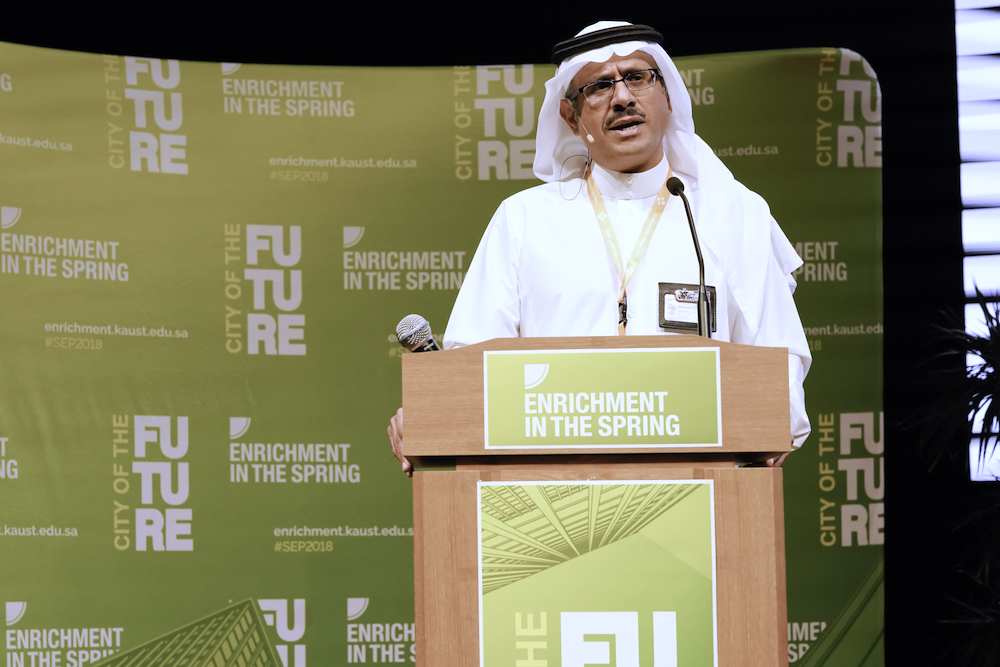Laying the foundation for future cities

Khaled Alrashed, president and CEO of Saudi Electricity Company for Projects Development, spoke on future smart cities during his recent KAUST Enrichment in the Spring keynote. File photo.
-By Meres J. Weche, KAUST News
"By 2030, 60 percent of the global population will live in cities. That's a challenge. Creating a high quality of living in cities is indeed the challenge of the century," said Khaled Alrashed, president and CEO of Saudi Electricity Company for Projects Development, during his recent KAUST Enrichment in the Spring keynote. "It is a challenge for all of us, including the utilities."
An engineer by training, Alrashed is passionate about paving the way for the smart cities of the future by taking on ambitious challenges in developing smart grids, adaptable production and distribution, artificial intelligence (AI), sensors and large-scale optimization.
As part of his leadership role at the Saudi Electricity Company, Alrashed has embarked on an evolving partnership with KAUST to help his institution tackle fostering research, development and innovation.
"KAUST is one of the great resources within the Kingdom, and I hope that we will work on more initiatives in the future," he highlighted. "We do have great lines of communication with the University, especially KAUST Innovation."
"We have plans to establish a collaboration to make use of the Shaheen supercomputer at KAUST. We have big data—we have a lot of information. If we can implement a kind of algorithm which can predict what the load on the grid will be, we can better plan our generation resources," he explained.

Khaled Alrashed, president and CEO of Saudi Electricity Company for Projects Development, speaks during his 2018 Enrichment in the Spring keynote lecture on campus. File photo.
Building a smart cities ecosystem
Alrashed focused on the fact that utility companies play a major role in supporting the quality of urban living in existing smart cities and new ones to be built in the future. Indeed, more than 250 smart cities are currently in the planning stages of construction around the world. This includes 46 in North America, 84 in Europe, 17 in Latin America, 31 in the Middle East and Africa and 74 in the Asia Pacific region.
As Alrashed argued, Saudi Arabia is in a good position to play an important part in the ecosystem of global smart cities. Pointing to the recent MOU signing between the Kingdom and Japan's SoftBank to establish a solar power harvesting installation to deploy 200,000 megawatts—the largest in the world that will be spread throughout the Kingdom—Alrashed hopes that "Saudi Arabia will become the battery of the world that will be able to export the solar energy."

Khaled Alrashed, president and CEO of Saudi Electricity Company for Projects Development, noted smart cities face many challenges in the future during his 2018 Enrichment in the Spring keynote lecture. 'KAUST is one of the contributors of the solutions to these challenges,' he said. File photo.
The role of renewable energy in the future
The development of renewable energy infrastructures in the Kingdom is a major pillar of Saudi Arabia's Vision 2030. The vision and mission of the Saudi Electricity Company provide the country with world class power services and empowering the Kingdom to energize the world.
During his presentation, Alrashed displayed a quote from Wellington Webb, former mayor of Denver, Colorado, U.S., which read: "The 19th century was a century of empires, the 20th century was a century of nations and the 21st century will be a century of cities."
Alrashed argued that smart cities of the future face eight major challenges: traffic congestion (reducing urban mobility and general comfort), air pollution (which causes fatal illnesses), CO2 emissions, crime, water scarcity, waste, population density (challenging urban logistics) and extreme weather.
"KAUST is one of the contributors of the solutions to these challenges," said Alrashed.
Indeed, the major research pillars at KAUST—water, food, energy and the environment—are focused on developing the country and region's burgeoning knowledge-based economy.

Khaled Alrashed, president and CEO of Saudi Electricity Company for Projects Development, stands with Marie-Laure Boulot, KAUST manager of Enrichment Programs, after his Enrichment in the Spring keynote talk on campus. File photo.
Some of the solutions highlighted by Alrashed during his talk, which the Saudi Electricity Company is tackling with the help of in-Kingdom universities and institutions, are based on the fundamental premise that smart cities of the future must be highly connected urban spaces. This means they must be based on smart energy, smart water and waste, smart transport and smart buildings—to name a few.
Utility providers must also play a major role in providing solid infrastructure in the form of rooftop PVs, a robust intelligent grid, decentralized energy storage systems, smart homes, electric vehicles and charging stations.
Most importantly, as Alrashed cautioned, "smart cities without the participation of the citizens will not be smart. We all need to be participants."
Related stories:
- The new way we do things
- Intelligent networks and the human element
-
Smart cities tackling the problems of tomorrow

